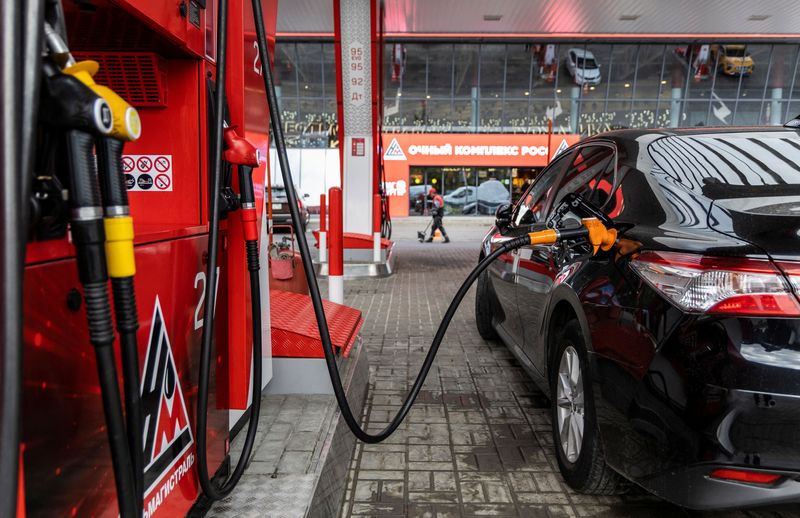MOSCOW (Reuters) -Russian wholesale gasoline Ai-92 grade prices fell by 9.7% to 55,892 roubles ($582) per metric ton on Friday, according to exchange data, following a government ban on fuel exports.
Diesel prices were down 7.5% to 66,511 roubles per ton, according to the data from the St. Petersburg International Mercantile Exchange (SPIMEX).
Wholesale fuel prices in Russia had been steadily rising this year amid fuel shortages, reaching all-time highs.
In response, Russia on Thursday temporarily banned exports of gasoline and diesel to all countries apart from four ex-Soviet states. Russia has exported about 1 million barrels of diesel/gasoil and 130,000 barrels of gasoline per day so far this year, according to J.P.Morgan.
Russian oil pipeline company Transneft stopped export shipments of diesel fuel from the Baltic Sea port of Primorsk and from Novorossiysk on the Black Sea, the TASS news agency cited the company as saying.
A Kremlin spokesman told reporters that the export ban would last for as long as necessary to ensure market stability.
"It was necessary to regulate this market against the background of harvesting work, agricultural processes... the ordinary consumer, not only the wholesale, but also the retail market," said spokesman Dmitry Peskov.
"How long they will be in place? As long as it takes to ensure stability in the market."
First Deputy Energy Minister Pavel Sorokin had said on Thursday that the ban was indefinite, and further government action would depend on the fuel "saturation" of the market.
Russian Deputy Prime Minister Alexander Novak held a meeting with Russian oil company managers on Friday to discuss the domestic fuel market, the government said.
The absence of fuel shortages was noted at the meeting.
Exchange prices for gasoline Ai-92 grade in the European part of Russia have fallen by more than 20% since Sept. 18 and prices for AI-95 by 22%, the government said.
As of Sept. 20, Russian gasoline stockpiles stood at 1.9 million tonnes, while diesel stockpiles amounted at 2.95 million tonnes.
Novak would be holding meetings with bosses of Russian oil companies on a weekly basis, Ifax news agency reported, citing his office.
Analysts expect the restrictions to be short-lived.
"We believe the ban indeed will be temporary and last only a couple of weeks, until the harvest concludes in October," J.P. Morgan said in a note to clients.

Citi analysts said they expected the Russian ban to last around six weeks.
($1 = 96.0000 roubles)